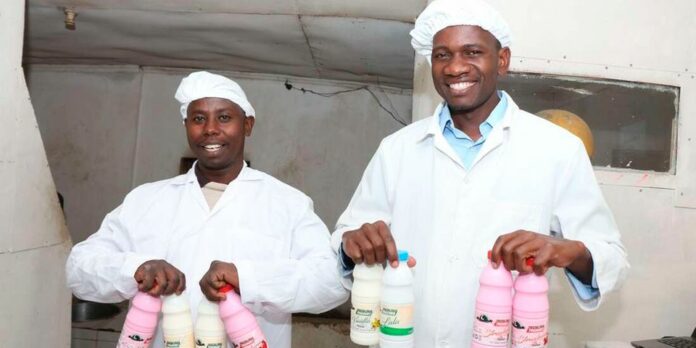Gabriel Kwendo, Emmanuel Ogise, and Joseph Bosire met in 2011 at Egerton University, where they had enrolled to pursue animal science-related courses.
They started a friendship that, years later, gave birth to a successful dairy products company. The three started by selling milk before advancing to processing yoghurt under their company name Comrade Dairy and Food Enterprises.
The idea to start selling milk popped up in 2018, and they equally contributed money to step into the business. Each contributed Sh120,000 before receiving an additional Sh500,000 funding from various incubation programs at the university.
They used the money to purchase a fridge, milk cans, and pasteurizer and leased a shop in Njoro, Nakuru county, for operations. They sourced fresh milk from farmers at Sh38 per liter, Pasteurize it and supply it to their customers.
“We began by selling pasteurized milk to the community. It has been an interesting journey; when we started, we were carrying milk on our backs from the farmers to the facility,” Bosire stated.
Profitable businesses that thrive among university students
According to Ogise, their main target when they started was Egerton University students, supplying them with fresh milk.
Four years later, their company advanced from selling milk only to processing sweet yoghurt and other dairy products.
“We are now making yoghurt and sour milk besides selling fresh milk, our premier product. We make strawberry and vanilla yoghurt flavors,” Kwendo said.
They sell their products at both wholesale and retail prices. A 500ml pack of yoghurt from the facility goes at a wholesale price of Sh80 and a retail price of Sh100.
For sour milk, a liter retails at Sh120, and fresh milk at Sh70. The products target mid and low-income earners. The trio has created not only employment but also a market for dairy farmers in the region.
They are working with around 60 dairy farmers across Njoro, from who they collect 180 – 300 liters of milk per day. They have also created employment for 10 youths.
The business partners cite the lack of enough financing to help improve production capacity as one of their major challenges.
“We are seeking funds to help us procure more machines such as a continuous pasteurizer (plate heat exchanger or tubular heat exchanger), a homogenizer, separator, a packaging machine, a steam boiler, milk silos, and fermentation tanks.
How I Used Sh 100,000 to set up my profitable yoghurt business
They will not only help us improve our production capacity and efficiency but also the quality of our product,” Kwendo explains.
To run such a business, one needs licenses from the county government, Kenya Dairy Board (KDB), and another for standardization from the Kenya Bureau of Standards.
The KDB inspects the premises for processing suitability, while county public health officers for health standards. Kebs analyses the products for quality standards. All the licenses cost them about Sh30, 000.









